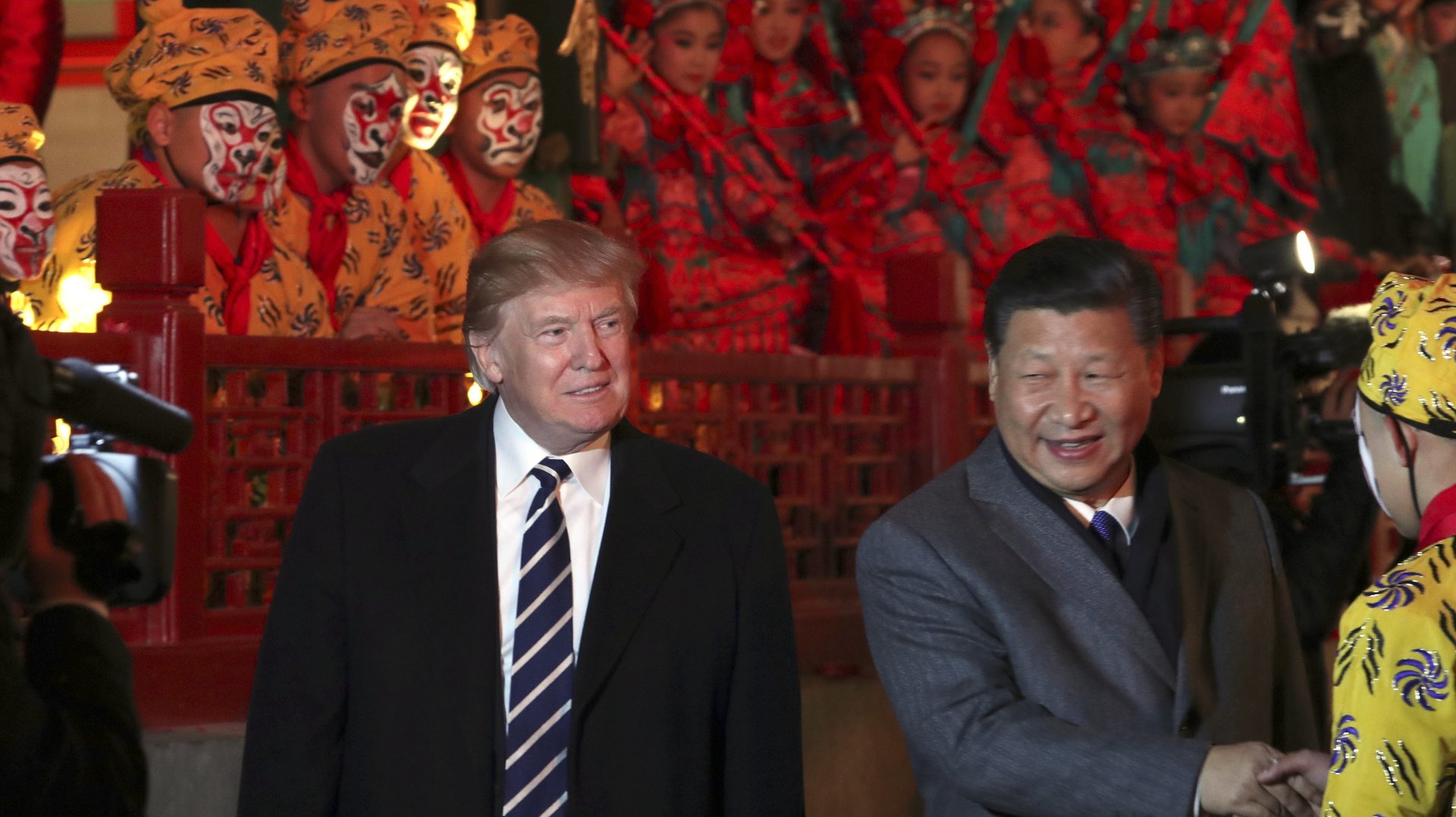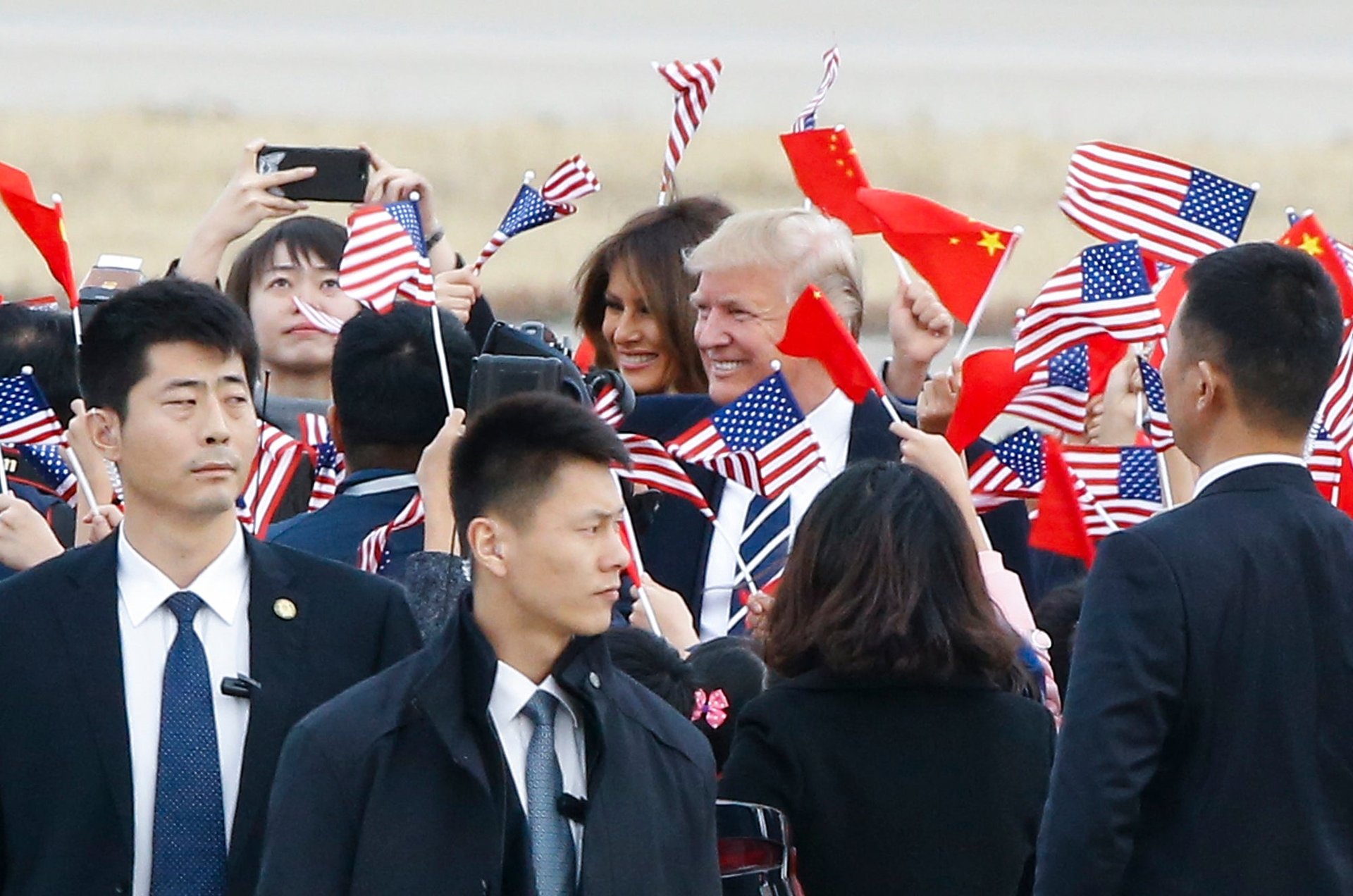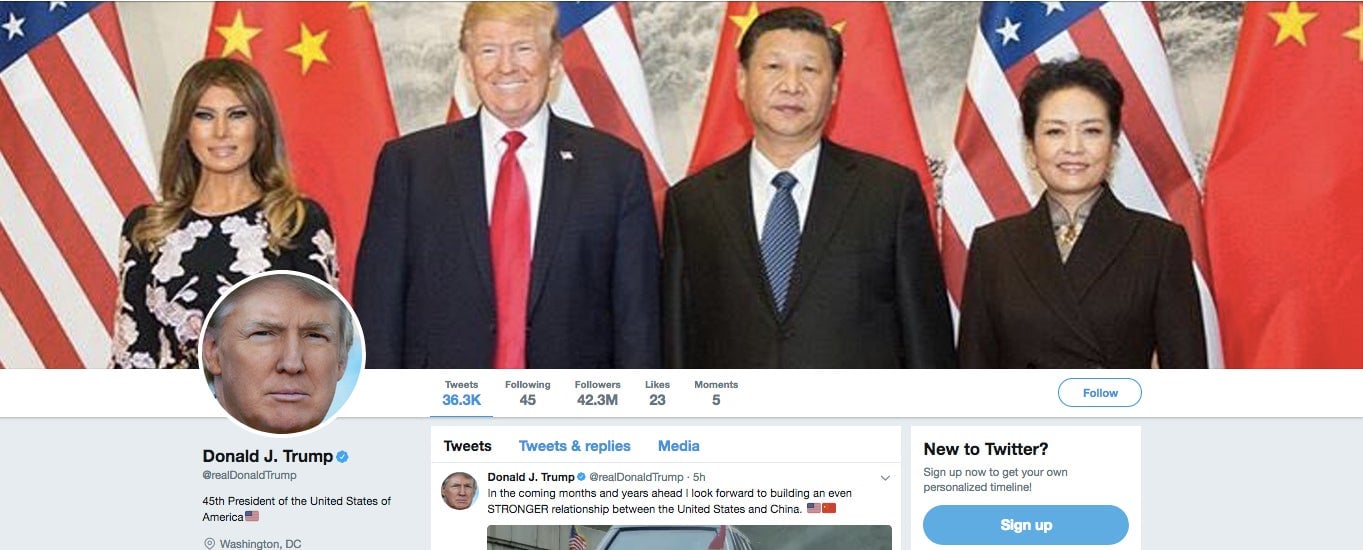Beijing is playing Trump “like a fiddle,” an ex-ambassador to China says
Japanese prime minister Shinzo Abe’s recent hosting of Donald Trump was a masterclass in how to make the US president comfortable—feed him familiar food, take him on his favorite outing, golf, and tell him how much you like him.


Japanese prime minister Shinzo Abe’s recent hosting of Donald Trump was a masterclass in how to make the US president comfortable—feed him familiar food, take him on his favorite outing, golf, and tell him how much you like him.
But Chinese president Xi Jinping added a creamy layer of pomp and circumstance to the mix when the White House delegation reached Beijing. Trump has been feted with everything from an unprecedented private dinner in the Forbidden City to a red carpet welcome across from Tiananmen Square, the Beijing landmark where hundreds of students were killed by the Chinese military in 1989.
Trump has responded in kind, calling Xi a “very special man” with whom he has “great chemistry.” While US businessmen had high hopes that Trump and his back-to-the-1980s China advisors would wring concessions from Xi to cut the $350 billion trade deficit, the only concrete result has been a mish-mash of previously announced deals and non-binding agreements that probably aren’t worth the $250 billion both governments claim.
Chemistry with Xi Jinping?
Beyond the numbers, it’s Trump’s embrace of Xi that has diplomats and human rights activists around the world concerned. China’s government is “playing Trump like a fiddle,” said Jorge Guajardo, Mexico’s ambassador to China from 2007 to 2013. “You don’t have good chemistry with a Chinese leader who doesn’t speak your language and is geared to not develop chemistry,” he said.
The Communist Party’s top aides are masterful at making diplomats and foreign businessmen feel special, he said, warning that Trump may be particularly susceptible to Beijing’s tactic of flattering foreigners with over-the-top ceremony and then refusing to change.
“You leave that meeting thinking ‘It went great,’” said Guajardo. And then when it comes time to negotiate a practical agreement, if you invoke the special friendship you’ve formed, Beijing officials “laugh and say ‘No, let’s not confuse all that pomp and circumstance with the meat of the matter.’”
“I would be lying to you if I tell you I didn’t fall for it when I was there,” he added.
Greetings from Tiananmen
The fact that Beijing went to such lengths is a sign that Trump’s tough talk in the run up to the last year’s presidential election has the Communist Party concerned, analysts say. But rather than responding with strong demands, Trump has been incredibly conciliatory.
Trump was greeted at the airport by a crowd waving American flags, and a military lineup. In contrast, former president Barack Obama was forced during his last China trip to exit from the underbelly of Air Force One because there was no staircase on the tarmac in Hangzhou.

The next day, Trump was welcomed at the Great Hall of the People, which faces Tiananmen Square, the site of an incident so sensitive that China scrubs any mention of it, including the date that it happened, from the internet.
Trump tweeted compliments and thanks to Xi for the extravagant welcome, including a video of his carefully scripted walk.
Xi is an authoritarian leader who has brutally cracked down on political opposition and on citizens who question his policies, while attacking US interests. Past US presidents, both Democrat and Republican, have taken advantage of state visits to urge the Communist Party to stop stifling religious and political freedom. But Trump has not mentioned human rights once during his visit.
Instead, in a joint appearance with Xi, Trump gave China “great credit” for taking advantage of the US in trade deals, to applause from the Chinese audience, and gasps from the foreign press. For years, Trump has accused China of “robbing Americans” of money and jobs, but since meeting Xi in April he has become become a fan instead.
At the request of Beijing, questions were banned at the joint press conference Trump and Xi held, just the way that the authoritarian Communist Party prefers things, despite the fact that previous US administrations had insisted they be allowed.
To cap off his trip, Trump enjoyed an official state dinner in the Great Hall of the People. He has changed his Twitter header to a grainy photo of himself, the first lady, Xi, and Xi’s wife Peng Liyuan.

The fact that Trump didn’t mention human rights is only half of the problem, said Sophie Richardson, the China Director of Human Rights Watch. “The other half of the problem is this grotesque adulation of Xi Jinping and the total failure to acknowledge that this is an authoritarian regime,” she said.
After Trump’s praise for the military band-accompanied walk through Tiananmen Square, she said “I’ve run out of expletives.” The US is going to be in a much weaker negotiating position in the future, Richardson predicts.
Trump’s trip just gave bureaucrats in China’s Communist Party “every piece of ammunition they need to withstand or dismiss any criticism that might come their way on human rights issues.”
The trip to China may set a dangerous precedent when it comes to trade negotiations too, Guajardo said. Maintaining a “bilateral relationship with the US is now just a matter of stroking Trump’s ego, and that’s all it takes.”
Correction: An earlier version of this article said that Trump walked through Tiananmen Square. Although the US embassy places the Great Hall of the People in the square, it actually faces it from across the street.